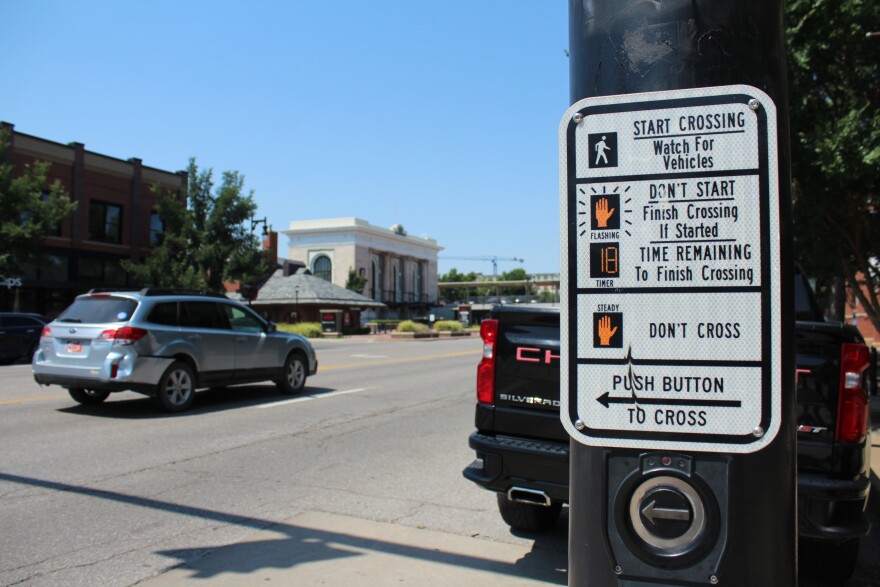Lisa Vayda says it can be a challenge to navigate downtown Wichita using her motorized scooter.
At times, it’s hard to find accessible parking. Uneven curbs and sidewalks can be difficult for her scooter to get over. And then there’s getting through parking garages, crosswalks and buildings.
When Vayda recently raised the issue to Sedgwick County commissioners, a set of stairs prevented her from reaching the lectern. Instead, she had to speak with a microphone from the back of the room.
“What you’re telling people is that not only are you not wanted, needed, valued,” she said. “You’re also telling someone who had thought about running for office: ‘Guess what? This is going to be really difficult.’”
Vayda spoke at the meeting about a $4.9 million project that converted several one-way streets downtown into two-ways. The city said the project would improve safety and walkability in the area.
But Vayda and other advocates say the city failed to add crucial accessibility features. That includes audio signals for blind and visually impaired people, and improved curb cuts for people who use wheelchairs or other mobility devices.
The city has since said it will go back and install audio signals at select crosswalks in the project area and look for curbs that need fixing.
“The City of Wichita is already implementing APS [audio pedestrian signals] on all new signal projects since last fall and continues to work with blind and visually impaired citizens and advocacy groups on their priorities for APS signal implementation in other parts of the city,” reads a statement from the city.

Vayda is a member of the Wichita-Sedgwick County Access Advisory Board. She said the board advised the city on ADA measures at the start of the project.
“And if they would have taken our input from the beginning, I think we could [have figured] out ways to save them money,” she said.
Wichita first established the access board about two decades ago as part of a settlement in a lawsuit over the city’s alleged lack of compliance with the Americans with Disabilities Act (ADA).
Board co-chair Tom Page is president of the Kansas affiliate of the National Federation of the Blind. He said the board seems to have less influence over the Wichita City Council than it once did.
“There was some progress, but what I've noticed is since around 2012 or so, that seems to have come to a stop,” he said. “And since then, the access advisory board mostly seems to me to encourage the city government to follow the law.”
Page said 2023 federal guidelines advise cities to use major traffic projects as a chance to add ADA features like accessible pedestrian signals.
He also said it could be difficult for a blind person to navigate a “patchwork” of signals, rather than having them be uniform across the downtown area.
As someone is trying to cross the street, those signals make sounds to indicate when the walkway is or isn’t clear. They also give extra crossing time for pedestrians, which can help people with canes, wheelchairs or other mobility devices.
The city said it will enhance its process for reviewing projects with the access board. It has also committed to adding audio signals to all future projects involving traffic signals.
To hold them to it, Page said he wants the council to formally adopt the 2023 federal guidelines and various best practices documents as city policy. He says that would clear up any grey areas on ADA compliance.
“We’re avoiding the Band-Aid approaches, and we’re recommending systematic mitigation of the current mess,” he said.
Among those who could benefit from a more accessible downtown is Charlie Wilks. He’s a musician who lives in downtown Wichita with his girlfriend, Ali, and her service dog – a 10-year-old yellow lab named Piper.
Wilks and his girlfriend are both blind, and Wilks said he’s had plenty of close calls. In some cases, turning cars have bumped into him as he crosses a crosswalk.
“The reason that it's important isn't that we can't cross the street without [audio signals],” Wilks said. “It's that crossing the street is far safer if we can be on the same page as the driver, and what the driver is looking at is the light.”

He said it’s a challenge to detect construction zones before walking into them. Rentable electric scooters and uneven sidewalks also create tripping hazards.
For Wilks, improved accessibility would mean more freedom and independence.
“Just having the freedom to go where you want, when you want,” he said. “Just like everybody else.”
Wilks suggested the city could develop an app to help pedestrians. The app might use a phone’s camera to detect traffic signals, or indicate when a sidewalk is closed due to construction.
It’s clear downtown Wichita is developing toward a bigger, busier future. People with disabilities, like Wilks and Vayda, say they just want to be part of it.
“I want to be in the room where it happens,” Vayda said. “I want to give you my input.”


